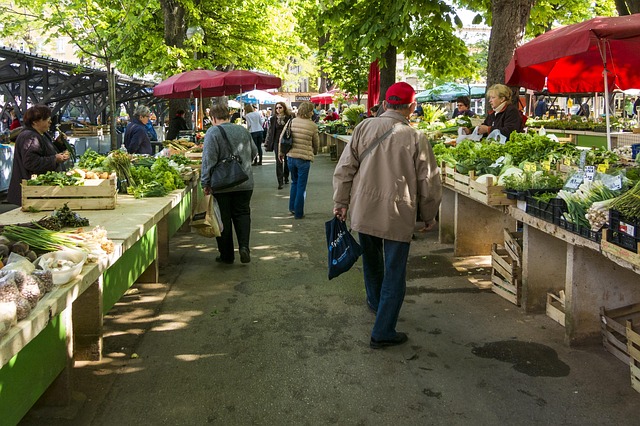Warehouse Sales and Markets in Germany – Places Full of Diversity and Discoveries
Across Germany, there are numerous warehouse sales and markets known for their wide variety of goods and products. These places reflect the diversity of German trade and offer fascinating insights into local structures beyond traditional retail. Those searching for special finds can experience the country’s cultural and economic diversity up close.

Germany’s warehouse sales and local markets represent more than just shopping destinations—they embody centuries of trade tradition, cultural exchange, and community gathering. These venues range from organized factory outlet events to weekly farmers’ markets, each offering distinct experiences and products. The diversity found across different regions reflects local customs, economic structures, and consumer preferences that have evolved over time.
What Makes Warehouse Sales in Germany Unique
Warehouse sales in Germany typically involve manufacturers and retailers offering surplus inventory, discontinued items, or slightly imperfect goods at reduced prices. These events often take place in industrial areas or factory premises, providing direct access to products without retail markup. Major brands in textiles, household goods, electronics, and furniture regularly host such sales, particularly during seasonal transitions. The appeal lies in accessing quality products at lower prices while supporting local manufacturing. Many warehouse sales operate on specific dates announced through company websites or local advertising, creating anticipation among regular shoppers who plan their visits accordingly.
Local Markets Throughout Germany and Their Cultural Significance
Local markets form an integral part of German community life, operating weekly or monthly in towns and cities nationwide. Farmers’ markets, known as Wochenmärkte, offer fresh regional produce, artisanal cheeses, baked goods, and flowers, connecting consumers directly with local producers. Flea markets, or Flohmärkte, provide platforms for selling secondhand items, antiques, collectibles, and handcrafted goods. These markets foster social interaction and preserve traditional trading practices while adapting to modern consumer needs. Cities like Munich, Hamburg, and Cologne host renowned markets that attract both locals and tourists, each reflecting regional characteristics through product selection and market atmosphere.
Diverse Shopping Options Across Different Market Types
Germany’s market landscape includes several distinct categories catering to varied interests. Christmas markets, or Weihnachtsmärkte, operate during the holiday season, offering seasonal decorations, gifts, and traditional foods. Specialty markets focus on organic products, vintage clothing, or specific crafts, appealing to niche consumer segments. Factory outlet centers, such as those in Metzingen or Wertheim Village, provide year-round access to discounted designer and brand-name merchandise. Street markets in urban neighborhoods offer multicultural products reflecting Germany’s diverse population, from Turkish spices to Italian delicacies. This variety ensures that shoppers can find markets aligned with their specific interests and needs throughout the year.
Cultural and Economic Variety Reflected in German Markets
The diversity of markets across Germany mirrors the country’s regional cultural differences and economic structures. Northern coastal cities feature markets with maritime influences, offering fresh fish and nautical-themed goods. Southern regions, particularly Bavaria, emphasize traditional crafts, local wines, and agricultural products. Eastern German cities blend historical market traditions with modern entrepreneurial approaches, creating unique hybrid market experiences. This cultural variety enriches the shopping experience and provides insights into regional identities. Economically, markets support small businesses, local producers, and independent vendors, contributing to community resilience and economic diversity beyond large retail chains.
Local Trade Insights and Shopping Strategies
Successful navigation of warehouse sales and markets in Germany benefits from understanding local trade practices. Arriving early at warehouse sales often provides access to the best selection before popular items sell out. Building relationships with regular market vendors can lead to better prices and insider information about upcoming products. Cash remains the preferred payment method at many markets, though card acceptance is increasing. Seasonal timing matters—end-of-season warehouse sales offer deeper discounts, while markets feature peak variety during harvest seasons. Researching event schedules through municipal websites, social media groups, and local newspapers helps plan visits effectively. Many cities also offer market apps providing locations, operating hours, and vendor information.
Practical Considerations for Market Shopping
When exploring warehouse sales and markets in Germany, several practical factors enhance the experience. Transportation access varies—some warehouse sales require personal vehicles due to industrial locations, while urban markets typically connect well to public transit. Bringing reusable shopping bags aligns with German environmental consciousness and proves practical for carrying purchases. Comparing prices across different vendors at larger markets helps identify the best value. Understanding return policies at warehouse sales is important, as many operate on final-sale terms. Language considerations matter less in major cities where vendors often speak English, but basic German phrases facilitate interactions in smaller towns. Dress appropriately for weather conditions, as many markets operate outdoors regardless of season.
The combination of warehouse sales and local markets creates a shopping ecosystem that reflects Germany’s balance between tradition and modernity. These venues offer alternatives to conventional retail, providing value, variety, and community connection. Whether seeking specific bargains or simply exploring local culture, Germany’s diverse market landscape rewards curious shoppers with memorable discoveries and authentic experiences that capture the character of different regions throughout the country.




